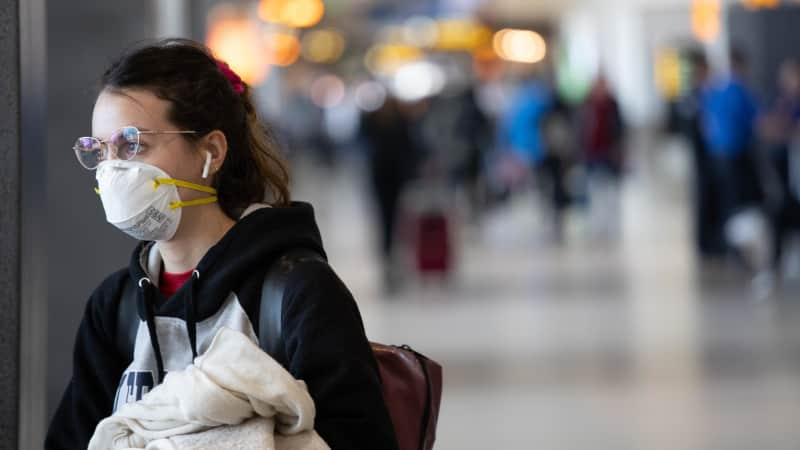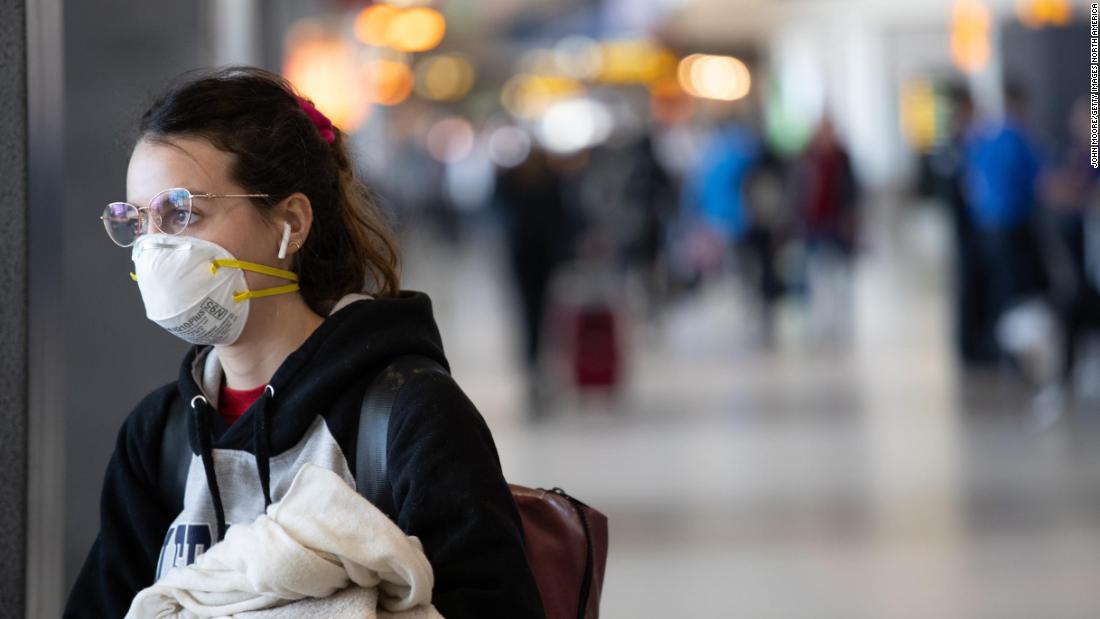(CNN) — Glimmers of a gradual return to air travel mean airlines are rolling out new policies aimed at protecting passengers and crew from coronavirus transmission and increasing consumer confidence in air travel safety.
Two days after JetBlue announced that passengers would be required to wear masks beginning May 4, both Delta Air Lines and American Airlines adopted the same policy.
Anyone who cannot keep a face mask in place, including children, will not be required to wear one. Delta will also implement its mask directive on May 4.
All three US carriers announced earlier this week that they were requiring employees to wear face masks.
Smaller carrier Frontier Airlines will also require passengers to wear a face covering over their nose and mouth, effective May 8. Face coverings have been required for Frontier flight crews since April 13.
These updates come just days after TSA marked its highest number of screened passengers in the US since April 3. The TSA figure — 128,875 passengers screened on April 26 — was still only about 5% of the 2.5 million people screened on the equivalent day in 2019, but it’s an uptick nonetheless and safety measures are top-of-mind for anyone considering flying.
As people in many corners of the world begin to move around more freely, airlines are issuing safety policies that are likely to evolve with the pandemic.
All of the carriers have plans for enhanced cleaning and sanitation.
Here’s where some major carriers stand so far on personal protective equipment and social distancing measures:
United Airlines
“We are not mandating that passengers wear a mask, however, we strongly encourage travelers follow CDC guidance to wear a face covering when social distancing is difficult,” said Nicole Carriere, a spokeswoman for United. “By providing the masks, we’re making it that much easier for them to do so.”
The carrier has also modified in-flight service to minimize touchpoints and has moved primarily to pre-packaged foods and sealed beverages.

A passenger prepares to board a flight departing Seattle-Tacoma International Airport on March 15.
John Moore/Getty Images North America
Delta Air Lines
Delta Air Lines announced Thursday that it is requiring all passengers to wear face masks or other coverings beginning May 4. The airline also requires all employees to wear masks or face coverings when unable to maintain the six-foot social distancing rule.
Passengers will be informed of the new requirement through pre-fight emails, alerts on the Delta website and app, as well as at the airport.
“While we continue to encourage customers to bring their own face covering when traveling with us, supplies will be available for customers who need them,” a press release says.
American Airlines
The airline has also turned off some computers and kiosks at ticket counters to encourage social distancing.
“American will not assign 50% of main cabin middle seats or seats near flight attendant jump seats on every flight, and will only use those middle seats when necessary,” the carrier’s temporary policy reads.
JetBlue Airways
“Wearing a face covering isn’t about protecting yourself, it’s about protecting those around you,” said Joanna Geraghty, president and chief operating officer of JetBlue, in a statement. “This is the new flying etiquette.”
JetBlue has also limited the number of available seats on most flights and regularly reviews seat assignments to maximize space between passengers.
Air Canada
Masks and other protective equipment common in Asia
Korean Air is providing cabin crew with protective clothing, including goggles, masks and gloves.
All Korean Air passengers are required to wear masks, and the airline is providing surgical masks and hand sanitizer at airports and on aircraft.
Some European carriers are offering or requiring masks
Passengers must wear face masks when flying with Lufthansa Group beginning May 4. The group includes Lufthansa, Swiss and Austrian Airlines. Flight attendants will also be required to wear masks, according to a Lufthansa Group news release.
Lufthansa added that leaving middle seats vacant will no longer be necessary.
“As a result of this new regulation, the middle seat that has thus far been left vacant in Economy and Premium Economy Class, will no longer remain a necessity, as the facial covering provides the necessary protection,” the news release said.
“Yet, currently, due to a decrease in flight demand, seats will be allocated as far apart as possible throughout the cabin.”
Air France says on its website that the majority of its flights are not full, allowing social distancing.
